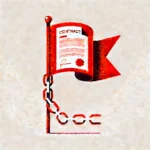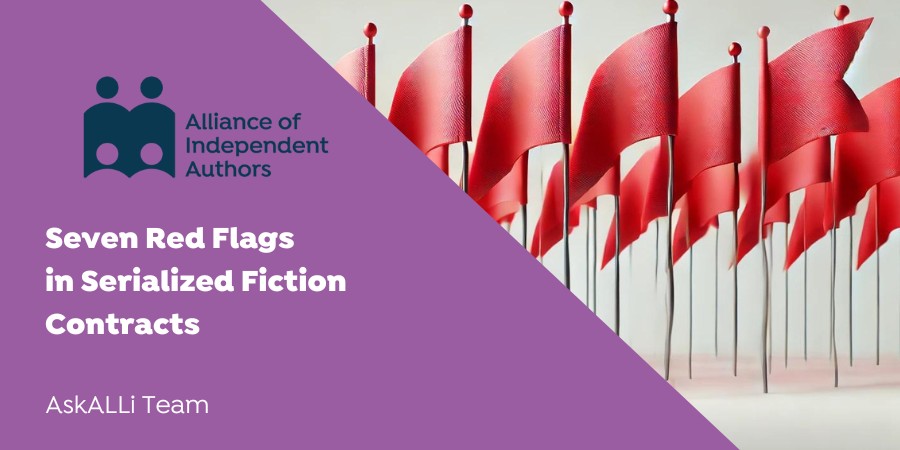Serialized fiction platforms like Radish, Dreame, and Fizzo have become really popular with indie authors looking to share their stories one chapter at a time. These apps let writers release their work in installments, keeping readers hooked and coming back for more, much like a TV series. While they offer a variety of genres, they tend to focus on popular categories like romance and fantasy, making them a good fit for authors writing in those niches. They also offer the potential for exposure and, in some cases, income.

John Doppler, Services Watchdog
However, many authors jump in without fully understanding the contracts they’re signing. These agreements often include clauses that could limit an author’s rights, reduce their earnings, or even take away creative control. If you're looking to build a long-term writing career, it’s important to know what you’re signing before you give away valuable rights.
In this post, we’ll dive into the top seven red flags to watch for in serialized fiction contracts, based on John Doppler’s analysis from the Alliance of Independent Authors’ Watchdog Desk. John has gone through many of these contracts and found some common issues that could seriously affect your career as an author. Knowing what to look for can help you avoid costly mistakes and make smarter choices.
Red Flag 1: Waiving Moral Rights
 Moral rights are the protections that ensure you, as the author, are properly credited for your work (right of attribution) and that your work isn’t changed in ways that compromise its integrity (right to maintain its original form). These rights are crucial for maintaining control over how your story is presented to the world.
Moral rights are the protections that ensure you, as the author, are properly credited for your work (right of attribution) and that your work isn’t changed in ways that compromise its integrity (right to maintain its original form). These rights are crucial for maintaining control over how your story is presented to the world.
When you waive your moral rights, you give up those protections. This means the publisher can change your work—altering characters, plots, or even the genre itself—without your approval. In some cases, they could even publish it under someone else’s name. For any author trying to build a career or maintain a personal brand, this can be disastrous.
John explains it clearly: “Waiving moral rights allows the publisher to alter your work in any way it chooses, changing plots, characters, and even the genre of the work. Serialized fiction app contracts often include a similar clause that allows significant editing and modification of a work, but this can be done without waiving moral rights across the board.”
A great example of this problem is ByteDance’s Fizzo app. Fizzo’s contract requires authors to waive their moral rights entirely, allowing the platform to make changes without input from the original writer. This means your carefully crafted characters or storylines could be altered in ways that you never intended.
For many authors, this kind of clause should be a dealbreaker. When you sign away your moral rights, you lose control over the work you’ve put so much effort into. In a worst-case scenario, your name could be attached to a version of your story that doesn’t reflect your original vision.
Always make sure you retain your moral rights in any contract. It’s one of the most important ways to protect the integrity of your work and ensure your personal brand stays intact.
Red Flag 2: Sweeping Rights Grabs
 A “rights grab” happens when a contract grants the publisher more control over your work than necessary. While an author typically grants rights for publication, some contracts try to claim additional rights—like the ability to create sequels, prequels, or even adaptations (film, audio, etc.)—without proper compensation or your consent.
A “rights grab” happens when a contract grants the publisher more control over your work than necessary. While an author typically grants rights for publication, some contracts try to claim additional rights—like the ability to create sequels, prequels, or even adaptations (film, audio, etc.)—without proper compensation or your consent.
These sweeping rights grabs can be particularly harmful. Imagine a publisher creating low-quality sequels or adaptations of your work and profiting from them, while you, the original creator, receive little or no compensation. Worse, they may publish these works under your name, harming your reputation and brand.
As John points out, “The rights granted in any publishing contract should be limited to those necessary to publish the work in the formats, languages, and regions agreed upon, and for a specific length of time. Rights grabs attempt to seize control of valuable subrights such as film rights, translations, and dramatic adaptations which the publisher may not be qualified or able to leverage.”
A perfect example of this is Stary Pte Ltd, the parent company of Dreame. Stary’s contracts often grant them rights to your work in perpetuity, which means they retain control over your story forever. This could tie up your rights indefinitely, preventing you from making deals for adaptations or foreign translations with other publishers.
These rights grabs aren’t always obvious in contracts, so it’s crucial to read the fine print. Always ensure the rights you’re granting are clearly defined, limited in scope, and time-bound. That way, you retain control over the future of your work and its potential adaptations.
Red Flag 3: Payments Based on Net Profits
 The term “net profits” might sound straightforward, but in publishing contracts, it can be a red flag. Net profits refer to what’s left over after all expenses are deducted from revenue. This leaves a lot of room for manipulation, often referred to as “Hollywood accounting,” where a publisher deducts a wide range of expenses—marketing, operational costs, and more—before calculating your share. The result? Authors often see little to no profit, even if their work is successful.
The term “net profits” might sound straightforward, but in publishing contracts, it can be a red flag. Net profits refer to what’s left over after all expenses are deducted from revenue. This leaves a lot of room for manipulation, often referred to as “Hollywood accounting,” where a publisher deducts a wide range of expenses—marketing, operational costs, and more—before calculating your share. The result? Authors often see little to no profit, even if their work is successful.
When publishers base your payment on net profits, they can reduce your earnings to zero by deducting things that are typically their responsibility. This is a common tactic used to cut down the royalties they owe the author.
As John explains, “Expenses such as marketing, technical infrastructure, data transfer fees, labor costs, production costs, and operational costs are normally borne by the publisher as the cost of running their business. Shifting those burdens to the author is often an exploitative practice.”
Platforms like Dreame and Fizzo use this model, which can severely reduce what authors take home. These contracts often give the publisher the freedom to deduct vague or undefined costs from the revenue, leaving authors with much less than they expect. The lesson here? Always be wary of contracts that offer payment based on net profits instead of clear, upfront royalties.
If you see “net profits” mentioned in a contract, it's worth scrutinizing the details or even consulting a legal expert. A better deal would be one that defines payments based on gross profits or, ideally, a clear percentage of the revenue, without excessive deductions.
Red Flag 4: Lack of Transparency
 In any publishing contract, transparency is key. Authors need to know how their earnings are calculated and on what basis they're paid. When contracts are vague about these details, it opens the door to potential exploitation. Without clear metrics—like pages read, number of downloads, or other performance indicators—you can’t be sure you're getting paid fairly.
In any publishing contract, transparency is key. Authors need to know how their earnings are calculated and on what basis they're paid. When contracts are vague about these details, it opens the door to potential exploitation. Without clear metrics—like pages read, number of downloads, or other performance indicators—you can’t be sure you're getting paid fairly.
A lack of transparency is especially common in serialized fiction contracts. Some platforms don’t provide detailed information on how they calculate payments, making it difficult for authors to verify their earnings. If you’re not being told how your compensation is determined, it’s a big red flag.
As John points out, “A contract that does not clearly define how payments are calculated and paid can leave the author vulnerable to exploitation. Serialized fiction arrangements are particularly prone to opaque accounting.”
Platforms like Dreame and Fizzo often include these kinds of clauses. They don’t always share clear performance metrics, meaning the author has no way to check if the payments match the actual success of their work. This lack of transparency creates a situation where the publisher holds all the power, and the author is left in the dark.
The solution? Make sure any contract you sign lays out clear terms for how and when payments are calculated. The more detail provided, the less room there is for unpleasant surprises.
Red Flag 5: Non-Disparagement Clauses
 It's important to understand the difference between a non-disparagement clause and a non-disclosure clause. A non-disclosure clause is a standard part of most business contracts and protects confidential information, like trade secrets. It’s reasonable and expected. But a non-disparagement clause, also known as a gag clause, is different—and much more troubling.
It's important to understand the difference between a non-disparagement clause and a non-disclosure clause. A non-disclosure clause is a standard part of most business contracts and protects confidential information, like trade secrets. It’s reasonable and expected. But a non-disparagement clause, also known as a gag clause, is different—and much more troubling.
Non-disparagement clauses prevent you from speaking negatively about the company, even if you’ve had a bad experience. This means you can’t warn other authors or leave an honest review of the platform. It effectively silences you, making it hard to share information about unfair treatment or poor business practices.
John highlights the issue: “A non-disparagement clause, or gag clause, attempts to muzzle an author and prevent them from sharing information about their experiences with a company, often with draconian penalties for leaving a negative review or a post on an author's forum.”
One platform notorious for including gag clauses is Fizzo. In their contract, authors are prohibited from making any negative comments about the platform or its affiliates. This restriction leaves authors with no recourse if they face problems or feel mistreated by the company, and it prevents a healthy exchange of information within the author community.
Before signing any contract, make sure you're not agreeing to give up your right to speak out. It's one thing to protect trade secrets, but your ability to share honest feedback should never be compromised.
Red Flag 6: Excessive Right of First Refusal
 A Right of First Refusal (ROFR) clause gives the publisher the option to review and make an offer on your next project before you can take it elsewhere. While this can sometimes be reasonable, especially if it's related to a sequel or spin-off, excessive ROFR clauses can become a major problem if they're too broad or too open-ended.
A Right of First Refusal (ROFR) clause gives the publisher the option to review and make an offer on your next project before you can take it elsewhere. While this can sometimes be reasonable, especially if it's related to a sequel or spin-off, excessive ROFR clauses can become a major problem if they're too broad or too open-ended.
When a ROFR clause isn’t limited in scope or time, it can allow the publisher to claim first rights to anything you write, even if it’s completely unrelated to the original work. Worse, if the publisher takes too long to decide, it can tie up your future projects indefinitely, preventing you from moving forward with other opportunities.
As John explains, “Some serialized fiction contracts have laid claim to any work the author writes, regardless of whether it's related to work they've submitted to the publisher. ROFR must also be time-limited. If there is no limit on the time a publisher has to make an offer, they can sit on the work indefinitely, tying it up forever.”
A notorious example of this is Stary Pte Ltd, which owns Dreame. Their contracts often include broad ROFR clauses that could entangle an author’s entire body of work, not just the series they’re working on. Without a clear time limit, authors could find themselves stuck waiting for the publisher to decide, unable to pursue other deals.
To protect yourself, always make sure the ROFR clause is specific to related works (like sequels) and is time-limited. Thirty to sixty days is reasonable. Anything longer, or broader, can seriously restrict your creative freedom.
Red Flag 7: Termination Fees and Forfeitures
 A fair publishing contract should allow both parties to exit the agreement under reasonable conditions. Unfortunately, some contracts make it almost impossible for the author to terminate the agreement without heavy penalties. These excessive termination fees or forfeitures can trap authors in unfavorable deals.
A fair publishing contract should allow both parties to exit the agreement under reasonable conditions. Unfortunately, some contracts make it almost impossible for the author to terminate the agreement without heavy penalties. These excessive termination fees or forfeitures can trap authors in unfavorable deals.
In some cases, authors are required to repay all the earnings they’ve made or even multiple times that amount, just to break free from the contract. This leaves authors stuck in bad arrangements with no realistic way out, even if the publisher isn’t holding up their end of the bargain.
John warns, “There should be a prescribed way to exit the agreement after a reasonable period of time, or in the event that the publisher does not honor their obligations. Either should be permitted without penalty to the author, yet many contracts require the author to forfeit all compensation (or even double or triple what they were paid) to escape the contract.”
A good example is Fizzo, where authors face huge obstacles to ending their contract. In some cases, if they want to withdraw their work, they’re required to return all earnings and could be liable for additional penalties. This creates an impossible situation for authors who want to move on from the platform.
Before signing a contract, make sure the termination terms are fair. You should be able to exit the agreement if the publisher fails to meet its obligations or after a set time period—without having to repay everything you’ve earned or face steep penalties.
Conclusion
Getting involved with serialized fiction platforms can be exciting, but it's important to watch out for the legal pitfalls that come with the contracts. From waiving moral rights to unfair payment structures, these seven red flags can seriously impact your career. John Doppler’s analysis gives us a clear roadmap to avoid these issues. Always make sure you understand what you're signing, and when in doubt, get advice from a legal expert. Protecting your rights now will help safeguard your future as an author.
Thoughts or further questions on referencing for non-fiction, or any self-publishing issue?

If you’re an ALLi member, head over to the SelfPubConnect forum for support from our experienced community of indie authors, advisors, and team. Simply create an account (if you haven’t already) to request to join the forum and get going.
Non-members looking for more information can search our extensive archive of blog posts and podcast episodes packed with tips and advice at ALLi's Self-Publishing Advice Center.
And if you haven’t already, we invite you to join our organization and become a self-publishing ally.




